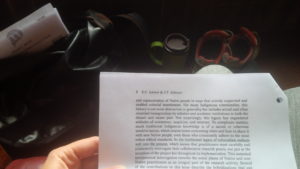In this study, I was interested in looking at what Indigenous health organizations do in urban communities, above and beyond providing health services. These organizations clearly have a role in providing community support, and I wondered if this support might translate into political representation or link to broader political struggles.
I chose the terminology of rights in order to get at this concept, and asked people in interviews and focus groups,
“Do you feel that your rights are respected in Prince George, in terms of health care services?”
People often said no.
“Indigenous rights” is a colonial term, referencing the Constitution Act and several court decisions over the past forty years.
Focusing on the concept of Indigenous rights has been controversial, with many scholars arguing that “rights” and “recognition” are not actually that useful for Indigenous peoples in Canada. Many of these scholars use the term “resurgence” instead.
Resurgence describes the ways in which Indigenous communities are undertaking political, cultural and legal rebuilding. Resurgence takes place without the intervention of the Canadian state; it is led, supported, and achieved by Indigenous peoples and Indigenous communities.
The role of Indigenous-led health and social service organizations might not be promoting Indigenous rights and recognition through the government – but to provide spaces and mechanisms through which Indigenous community resurgence can be supported in the city.


